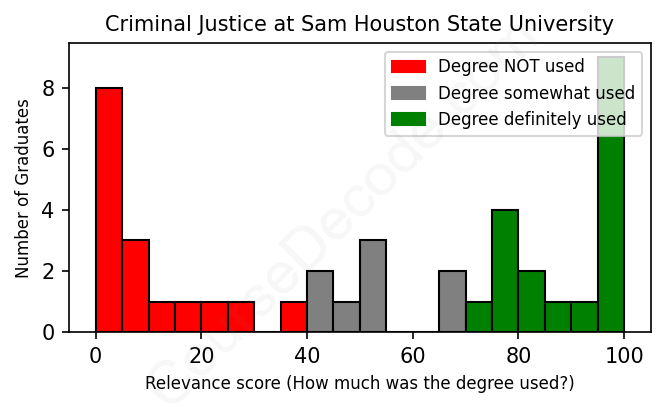
First, some facts. Of the Criminal Justice graduates from Sam Houston State University we've analyzed , here's how many have used (or NOT used) their degree in their career:

These are estimates based on AI analysis of 42 LinkedIn profiles (see below).
The verdict? Significantly below average. Overall, with an average relevance score of 51%, Criminal Justice graduates from Sam Houston State University have a much lower likelihood (-16%) of finding work in this field compared to the average graduate across all fields:
And for comparison, here's the chart for all profiles we've looked at across all degrees.
Also, after graduating, only 33% of these graduates have pursued further education other than another Bachelor's degree (such as a Masters degree or other), compared to the average across all profiles of 35%. This suggests a Bachelors degree is enough for most Criminal Justice graduates, and it's normal to look for work straight after graduation.
See the details:
|
Relevance score: 100% We think this person has gone into a career highly relevant to their degree. We think this person has gone into a career highly relevant to their degree.
DEGREE INFOGraduated in 2016 from Sam Houston State University with a Bachelor of Arts - BA in Criminal Justice. Also pursued further education since (see below). JOB HISTORY SINCE GRADUATIONPolice Sergeant Houston Police Department Feb 2019 - Aug 2023 Police Lieutenant  Houston Police Department Aug 2023 - Present FURTHER DEGREES DONE SINCE GRADUATINGMaster of Science - MSSam Houston State University 2016 - 2018 Doctor of Philosophy - PhD Walden University 2020 - 2025 ABOUTNo information provided. |
The top 10 most common jobs done by the graduates we've analyzed (ranked most common to least) are:
After analyzing various LinkedIn profiles of graduates from Sam Houston State University with a degree in Criminal Justice, it's clear that there are a lot of different career paths taken by these individuals. A common thread among several profiles is a solid representation of roles in law enforcement and public safety. Positions such as Police Officer, Detective, and Probation Officer stand out as particularly relevant, showcasing a direct application of the knowledge and skills acquired during their studies. Notably, many graduates have pursued roles that emphasize community safety and crime prevention, which align perfectly with the goals of a Criminal Justice degree.
However, there were also a significant number of graduates who found themselves in positions that are only tangentially related to their degree, such as managerial roles in retail, administrative positions, or even jobs in completely different fields like IT and hospitality. While some of these roles may require soft skills that could intersect with criminal justice principles—like leadership or communication—the core knowledge from their education in law enforcement, justice processes, and legal systems isn’t necessarily utilized daily. This variability suggests that while the degree provides a strong foundation for specific careers in criminal justice, graduates may also branch out into diverse sectors that do not directly build on their academic background.
Here is a visual representation of the most common words in job titles for Criminal Justice graduates (this is across all Criminal Justice graduates we've analyzed, not just those who went to Sam Houston State University):

From the looks of it, students who graduated with a Criminal Justice degree from Sam Houston State University have ventured into a mix of careers, both in and out of the criminal justice field. Right after graduation, many of them started with roles that align closely with their studies—like police officers, investigators, and juvenile probation officers. It seems like there's a solid chunk of graduates sticking to paths that directly engage with law enforcement or public service right out of the gate, which is promising for anyone interested in a law-related career.
Fast forward five to ten years, and there’s a bit of a mixed bag. While some folks have climbed the ranks in law enforcement, moving up to sergeant or captain positions, others have expanded into roles that stray from traditional criminal justice, such as project management and administrative roles in government and private sectors. A few have also landed legal positions, working as paralegals or legal assistants, which shows a nice bridge for those interested in law. However, the trajectory isn't uniform—some graduates have ended up in unrelated jobs that don’t reflect their criminal justice backgrounds. So, while there are definitely good career paths among these graduates, there's also an indication that not everyone found a job directly connected to their degree. It’s a mix of success and going off the beaten path a bit, but at least there’s a foundation in criminal justice for those who pursue it!
So, getting a Bachelor’s degree in Criminal Justice at Sam Houston State University is generally seen as pretty manageable, especially if you're interested in the topic. It covers a lot of ground, like law enforcement, criminology, and the legal system, which can be super interesting if you’re into that stuff. The coursework can be challenging at times, especially with research papers and projects, but it’s not considered one of the hardest degrees out there. If you stay organized, engage in your classes, and put in some effort, you should be able to handle it without too much stress. It's a solid choice if you’re looking for something that balances interest with a reasonable workload.
Most commonly, in the LinkedIn profiles we've looked at, it takes people 4 years to finish a Bachelor degree in Criminal Justice.
When you look at the job paths these Criminal Justice graduates from Sam Houston State University have taken, it seems like they’re doing pretty well overall, but there are definitely some variations. For example, a couple of them have moved really quickly into higher-level positions, like police sergeants and directors, which likely comes with decent salaries. Others have taken roles like research assistants or administrative jobs, which might not pay as well. It also seems like some graduates are sticking with law enforcement, where salaries can be more stable, while others are venturing into fields like law or management where they can potentially earn more in the long run. So, while some are cashing in big time, a few are still working their way up the ladder. Overall, it looks like they’re on a decent path to making good money, especially if they continue to progress in their careers!
Here is a visual representation of the most common words seen in the "about" section of LinkedIn profiles who have a Bachelor degree in Criminal Justice (this is across all Criminal Justice graduates we've analyzed, not just those who went to Sam Houston State University). This may or may not be useful:

Here are all colleges offering a Bachelor degree in Criminal Justice (ordered by the average relevance score of their Criminal Justice graduates, best to worst) where we have analyzed at least 10 of their graduates: